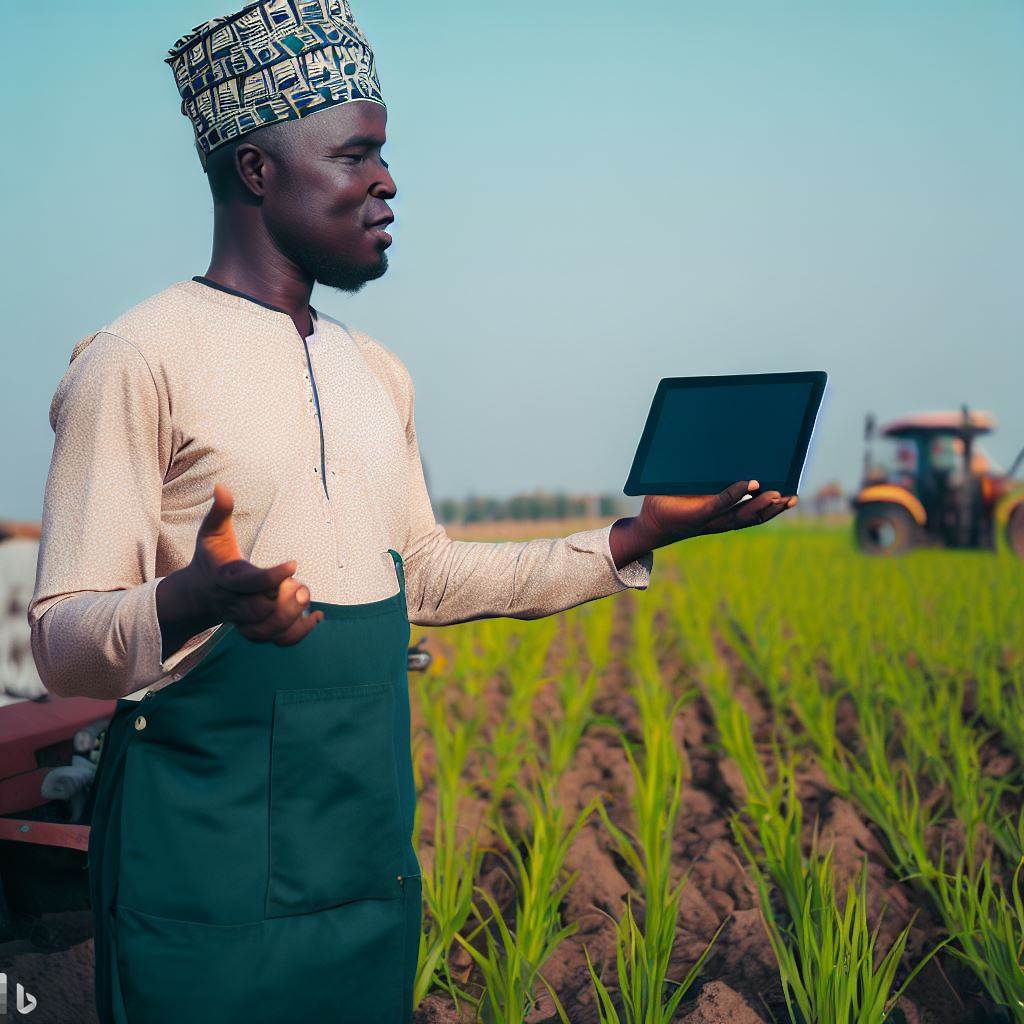Introduction
Empowering Nigerian Farmers through Financial Assistance
Nigerian farmers face challenges in accessing capital, hindering their agricultural potential and livelihood improvement.
This section sheds light on available financial assistance options, empowering farmers for sustainable growth and development.
Importance of Financial Support for Farmer
- Enhanced Productivity: Adequate funding allows farmers to invest in modern equipment, technology, and better farming practices.
- Increased Yield: Access to funds for quality seeds, fertilizers, and irrigation improves crop yield and quality.
- Risk Mitigation: Financial aid helps farmers manage risks associated with weather, pests, and market fluctuations.
- Innovation Adoption: Funds support research and innovation, leading to more efficient and sustainable farming methods.
- Market Access: Financial support aids farmers in accessing markets and connecting with buyers, improving income opportunities.
- Income Diversification: Assistance enables farmers to diversify income sources through livestock, poultry, or agro-processing ventures.
Available Financial Assistance
- Government Initiatives: Nigerian government offers grants, loans, and subsidies to support agricultural activities.
- Agricultural Development Banks: Institutions like the Bank of Agriculture provide loans tailored for farmers’ needs.
- Microfinance Institutions: Microloans enable small-scale farmers to access funds for inputs and equipment.
- Agricultural Cooperatives: Farmers’ groups offer pooled resources, credit, and market access.
- Non-Governmental Organizations (NGOs): Many NGOs provide grants and capacity-building programs for farmers.
- Agribusiness Investors: Private investors offer funding to farmers in exchange for a share of profits.
Challenges and Solutions
- Lack of Awareness: Farmers need information about available financial assistance options.
- Complex Application Process: Simplified application procedures and guidance can address this.
- Limited Accessibility: Digital platforms and mobile banking can improve access to funds for rural farmers.
Financial assistance plays a pivotal role in transforming Nigerian agriculture, improving livelihoods, and ensuring food security.
Challenges Faced by Nigerian Farmers
In Nigeria, farmers face numerous challenges that hinder their productivity and growth.
These challenges include limited access to credit, inadequate infrastructure, high input costs, and the effects of climate change.
Addressing these challenges is crucial in order to enhance agricultural practices and ensure food security in the country.
Limited Access to Credit
- Nigerian farmers often struggle to access credit to finance their farming activities.
- The lack of collateral and high interest rates make it difficult for farmers to secure loans.
- This limitation prevents farmers from expanding their operations and investing in modern technologies.
- Financial assistance programs can provide farmers with the necessary credit to increase production and improve yields.
Inadequate Infrastructure
- The state of infrastructure in rural areas of Nigeria is inadequate for efficient farming.
- Lack of good roads makes it difficult for farmers to transport their produce to the markets.
- Inadequate storage facilities result in post-harvest losses, reducing farmers’ income and profitability.
- Financial assistance can help in building and improving infrastructure, allowing farmers to connect with market opportunities.
High Input Costs
- The prices of agricultural inputs such as seeds, fertilizers, and pesticides are often high in Nigeria.
- Expensive inputs reduce farmers’ profitability and make farming less attractive for young individuals.
- Financial assistance can provide subsidies or grants to farmers, making inputs more affordable and encouraging cultivation.
Climate Change Effects
- Climate change presents a significant challenge for Nigerian farmers.
- Erratic rainfall patterns and prolonged droughts affect crop yields and livestock production.
- Farmers need financial assistance to adopt climate-smart practices and invest in irrigation systems.
- By providing support, farmers can mitigate the impact of climate change and build resilience in their farming operations.
Nigerian farmers face various challenges including limited access to credit, inadequate infrastructure, high input costs, and climate change effects.
Overcoming these challenges requires financial assistance to improve agricultural practices and ensure sustainable food production.
Governments, financial institutions, and international organizations should prioritize providing assistance to farmers to enhance the agriculture sector and promote economic development in Nigeria.
Read: Emerging Trends and Technologies in Agricultural Operations Management
Government Initiatives and Programs
Agricultural Credit Guarantee Scheme Fund
The Agricultural Credit Guarantee Scheme Fund is a government initiative aimed at providing financial assistance to Nigerian farmers.
It aims to enhance the agricultural sector’s access to credit facilities through the guarantee of loans given by banks to farmers.
This program’s objectives are to provide affordable credit facilities to farmers, enhance productivity and income generation, and stimulate agricultural development.
To be eligible, farmers must have a viable agricultural project and collateral for the loan.
The benefits of the Agricultural Credit Guarantee Scheme Fund include reduced risk for banks lending to farmers, increased access to credit by farmers, and the creation of employment opportunities in the agricultural sector.
Farmers can benefit from this program by expanding their agricultural activities, purchasing inputs, improving farm infrastructure, and ultimately increasing their agricultural output.
Growth Enhancement Support Scheme
The Growth Enhancement Support Scheme (GESS) is another government initiative designed to provide financial assistance to Nigerian farmers.
This program aims to empower smallholder farmers by providing them with improved access to agricultural inputs, such as fertilizers, seeds, and agrochemicals.
The objectives of the Growth Enhancement Support Scheme are to increase agricultural productivity, ensure food security, reduce poverty, and create employment opportunities in the agricultural sector.
Smallholder farmers who are registered with the scheme and have a valid farm operating plan are eligible to benefit from this program.
By participating in the Growth Enhancement Support Scheme, farmers can access subsidized fertilizers and other agricultural inputs.
This enables them to improve the quality and quantity of their agricultural production, leading to increased incomes and improved livelihoods.
Anchor Borrowers’ Program
The Anchor Borrowers’ Program is a government initiative targeted at providing financial assistance to Nigerian farmers, particularly smallholder farmers.
The program aims to create a linkage between anchor companies, such as processors and off-takers, and smallholder farmers to enhance agricultural productivity and promote economic development.
The objectives of the Anchor Borrowers’ Program include increasing agricultural production, reducing food importation, conserving foreign exchange, and facilitating job creation.
Smallholder farmers who are organized into groups and have a viable agricultural project are eligible to participate in this program.
By participating in the Anchor Borrowers’ Program, farmers can access credit facilities, improved inputs, and technical assistance.
This enables them to expand their production, increase their income, and improve their standard of living.
Additionally, the program helps to promote market opportunities for smallholder farmers by facilitating access to anchor companies for off-take agreements.
Overall, these government initiatives and programs play a crucial role in providing financial assistance to Nigerian farmers.
They aim to enhance agricultural productivity, increase income generation, reduce poverty, and promote economic development in the agricultural sector.
By taking advantage of these programs, farmers can access the necessary resources and support to improve their agricultural practices and ultimately contribute to food security and national economic growth.
Read: Impact of Climate Change on Livestock in Nigeria
Non-Governmental Organizations (NGOs) and Foundations
Non-Governmental Organizations (NGOs) and foundations play a vital role in providing financial support to Nigerian farmers.
These organizations are dedicated to improving the agricultural sector by providing grants, loans, and technical assistance.
Through their initiatives, they aim to enhance productivity, increase income, and promote sustainable farming practices.
Role of NGOs and Foundations
NGOs and foundations support Nigerian farmers financially in various ways:
- Grants: These organizations provide grants to farmers to invest in farm infrastructure, purchase modern equipment, and improve crop yields.
- Loans: NGOs and foundations offer low-interest loans to farmers, enabling them to expand their operations, adopt new technologies, and diversify their agricultural activities.
- Technical Assistance: These organizations provide technical expertise and training to farmers, helping them improve their farming techniques, manage pests and diseases, and access modern agricultural practices.
By offering financial support, NGOs and foundations empower Nigerian farmers, particularly small-scale farmers, to overcome financial constraints and develop sustainable agricultural practices.
Prominent Organizations and Foundations
Several prominent organizations and foundations actively provide financial assistance to Nigerian farmers:
- International Institute of Tropical Agriculture (IITA): IITA is an internationally renowned research institution that supports Nigerian farmers by creating and disseminating innovative agricultural technologies.
They provide grants for research, technical assistance, and capacity building. - The Dangote Foundation: Founded by Aliko Dangote, Africa’s richest man, this foundation focuses on poverty alleviation and economic empowerment.
The Dangote Foundation offers grants and loans to farmers, facilitating their access to financial resources. - Tony Elumelu Foundation: This foundation, established by Tony Elumelu, a Nigerian philanthropist and entrepreneur, promotes entrepreneurship and sustainable development in Africa.
Through their agriculture program, they provide training, mentorship, and seed capital to smallholder farmers. - Heifer International: Heifer International works towards ending hunger and poverty by supporting smallholder farmers.
They offer grants, livestock, and training to help farmers improve their livelihoods and build resilient communities. - Africa Rice Center (AfricaRice): AfricaRice is committed to improving the productivity and profitability of rice farming in Africa.
They provide grants, research support, and training programs to smallholder rice farmers, enabling them to adopt improved farming techniques.
These organizations, among many others, contribute significantly to the financial support and overall development of Nigerian farmers.
Their initiatives play a crucial role in enhancing agricultural productivity, promoting sustainable practices, and improving the income and livelihoods of farmers.
NGOs and foundations act as critical financial partners for Nigerian farmers, offering them grants, loans, and technical assistance.
Through their support, these organizations contribute to the growth and sustainability of the agricultural sector, enabling farmers to achieve higher yields, increase incomes, and improve their quality of life.
Read: Emerging Trends in Agronomy Sales in Nigeria

Financial Institutions and Microfinance Banks
Empowering Nigerian Farmers Through Financial Assistance
Financial institutions and microfinance banks are pivotal in providing tailored financial assistance to Nigerian farmers.
This section unveils loans, credit facilities, and services boosting agricultural progress, fostering economic growth in Nigeria.
Explore grants, loans, subsidies, and programs driving agricultural progress, contributing to a thriving farming sector in Nigeria.
Farming Cooperatives and Associations
When it comes to accessing financial assistance, farming cooperatives and associations play a crucial role.
These groups enable Nigerian farmers to pool their resources, negotiate better prices, and gain access to financial support. Here’s why these cooperatives and associations are essential:
Increased Bargaining Power
- Farmers who join or form cooperatives and associations can collectively negotiate better prices for their produce.
- By uniting, farmers have a stronger voice when dealing with buyers, processors, and suppliers.
- Increased bargaining power ensures that farmers receive fair compensation for their hard work.
Sharing of Knowledge and Best Practices
- Farming cooperatives and associations provide platforms for farmers to exchange ideas, information, and experiences.
- Through these groups, farmers can learn about new agricultural techniques, technologies, and markets.
- Members can share their successes and challenges, collectively solving problems and improving productivity.
Access to Affordable Credit
- Financial institutions, government agencies, and NGOs often prioritize lending to farming cooperatives and associations.
- These groups act as intermediaries, providing members with access to affordable credit facilities and loans.
- With access to financial support, farmers can invest in modern farming equipment, improved seeds, and quality inputs.
Cost Reduction through Bulk Buying
- By joining or forming cooperatives and associations, farmers can combine their purchasing power.
- Buying inputs, such as fertilizers, pesticides, and machinery, in bulk leads to significant cost savings.
- Reduced costs enable farmers to allocate their limited resources more efficiently, boosting profitability.
Collective Marketing and Market Linkages
- Farming cooperatives and associations facilitate collective marketing of farmers’ produce.
- Group members can access larger markets, including export opportunities, that may not be available individually.
- Through joint marketing efforts, farmers can command better prices and negotiate favorable contracts.
Strengthened Advocacy and Policy Influence
- Joining or forming farming cooperatives and associations gives farmers a united platform to advocate for their interests.
- These groups can engage with policymakers, influencing agricultural policies to benefit farmers.
- By voicing their concerns collectively, farmers can effect positive changes in the farming sector.
Farming cooperatives and associations offer numerous benefits to Nigerian farmers. By joining or forming these groups, farmers can access financial aid, better prices, and markets.
They also gain knowledge, share resources, and have a stronger voice in policy-making. To thrive in the agricultural sector, collaboration and collective action are vital.
Read: Importance of Agricultural Operations Managers in Nigerian Agribusiness
Research Grants and Scholarships
Research grants and scholarships play a crucial role in supporting Nigerian farmers by providing funding for research, innovation, and capacity building.
These financial assistance options enable farmers to enhance their productivity and sustainability in the agricultural sector.
Availability of Research Grants and Scholarships
- Research grants and scholarships are available for Nigerian farmers to facilitate their involvement in agricultural research.
- These opportunities support farmers who are passionate about discovering new methods, techniques, and technologies to improve agricultural practices.
- With the help of research grants and scholarships, farmers can explore innovative solutions and contribute to the growth of the agricultural sector.
- Various organizations and institutions within Nigeria and abroad offer these funding opportunities to assist farmers in their research endeavors.
- These grants and scholarships encourage Nigerian farmers to contribute to knowledge development in agriculture.
Organizations and Institutions Offering Funding
Several organizations and institutions provide research grants and scholarships specifically tailored for Nigerian farmers:
- Agricultural Research Council of Nigeria (ARCN): ARCN offers research grants to individual farmers and farmer groups for agricultural research projects.
- Tertiary Education Trust Fund (TETFund): TETFund provides scholarships to Nigerian farmers pursuing agricultural-related courses in tertiary institutions.
- Bill and Melinda Gates Foundation: This foundation offers research grants to Nigerian farmers focusing on innovative solutions for sustainable agriculture.
- West African Agricultural Productivity Program (WAAPP): WAAPP provides grants and scholarships to Nigerian farmers for research and capacity building initiatives.
- Nigerian Content Science and Technology Innovation Challenge (NCSTIC): NCSTIC offers funding to Nigerian farmers for research projects that promote indigenous technology in agriculture.
Benefits of Research Grants and Scholarships
The availability of research grants and scholarships for Nigerian farmers brings several substantial benefits:
- Financial Support: Research grants and scholarships alleviate the financial burden on farmers, allowing them to invest in research activities without financial constraints.
- Knowledge Expansion: These opportunities enable farmers to broaden their knowledge and skills through exposure to new techniques and technologies.
- Capacity Building: Grants and scholarships promote capacity building among farmers, enhancing their ability to implement innovative practices and enhance productivity.
- Networking Opportunities: Farmers who receive research grants and scholarships have the chance to collaborate with other like-minded individuals and institutions, fostering partnerships and knowledge sharing.
- Sustainable Agriculture: By supporting research and innovation, grants and scholarships contribute to the development of sustainable agricultural practices in Nigeria.
Research grants and scholarships for Nigerian farmers are essential in driving agricultural development and productivity.
The availability of financial assistance empowers farmers to conduct research, innovate, and build their capacity, leading to sustainable and impactful agricultural practices.
By partnering with organizations and institutions offering these opportunities, Nigerian farmers can contribute to the growth and advancement of the agricultural sector.
Conclusion
Financial assistance plays a crucial role in supporting Nigerian farmers and ensuring the growth and development of the agricultural sector in the country.
It is important for farmers to explore the various opportunities and resources available to them for financial support.
By accessing financial assistance programs, farmers can obtain the necessary funds and resources to invest in modern farming techniques, purchase quality seeds and fertilizers, and improve their overall productivity.
Moreover, financial assistance programs provide farmers with the means to mitigate risks, such as crop failure due to adverse weather conditions or pests.
Therefore, it is essential for stakeholders to continue investing in and expanding financial assistance programs for the agricultural sector in Nigeria.
Through sustained support and investment, more farmers will be able to access the necessary resources and financial aid needed to thrive in their farming endeavors.
By doing so, the agricultural sector will experience significant growth, ensuring food security, creating employment opportunities, and contributing to overall economic development in Nigeria.
It is crucial for all stakeholders, including the government, financial institutions, and development partners, to actively work together and prioritize the expansion of financial assistance programs for Nigerian farmers.
Together, we can bring about positive change and empower farmers to unlock their full potential, ultimately contributing to the transformation of Nigeria’s agricultural landscape.




